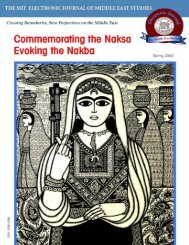The Link - Americans for Middle East Understanding
The Link - Americans for Middle East Understanding
The Link - Americans for Middle East Understanding
Create successful ePaper yourself
Turn your PDF publications into a flip-book with our unique Google optimized e-Paper software.
qÜÉ=iáåâ= m~ÖÉ=S=<br />
selected Nouri el-Said as prime minister. El-Said<br />
supported the British and, as hatred of the British grew,<br />
he was <strong>for</strong>ced from office in March 1940 by four senior<br />
army officers who advocated Iraq’s independence from<br />
Britain. Calling themselves the Golden Square, the<br />
officers compelled the regent to name as prime minister<br />
Rashid Ali al-Kilani, leader of the National Brotherhood<br />
party.<br />
<strong>The</strong> time was 1940 and Britain was reeling from a<br />
strong German offensive. Al-Kilani and the Golden<br />
Square saw this as their opportunity to rid themselves of<br />
the British once and <strong>for</strong> all. Cautiously they began to<br />
negotiate <strong>for</strong> German support, which led the pro-British<br />
regent Abd al-Ilah to dismiss al-Kilani in January 1941.<br />
By April, however, the Golden Square officers had<br />
reinstated the prime minister.<br />
This provoked the British to send a military <strong>for</strong>ce<br />
into Basra on April 12, 1941. Basra, Iraq’s second largest<br />
city, had a Jewish population of 30,000. Most of these<br />
Jews made their livings from import/export, money<br />
changing, retailing, as workers in the airports, railways,<br />
and ports, or as senior government employees.<br />
On the same day, April 12, supporters of the pro-<br />
British regent notified the Jewish leaders that the regent<br />
wanted to meet with them. As was their custom, the<br />
leaders brought flowers <strong>for</strong> the regent. Contrary to<br />
custom, however, the cars that drove them to the<br />
meeting place dropped them off at the site where the<br />
British soldiers were concentrated.<br />
Photographs of the Jews appeared in the following<br />
day’s newspapers with the banner “Basra Jews Receive<br />
British Troops with Flowers.” That same day, April 13,<br />
groups of angry Arab youths set about to take revenge<br />
against the Jews. Several Muslim notables in Basra heard<br />
of the plan and calmed things down. Later, it was<br />
learned that the regent was not in Basra at all and that<br />
the matter was a provocation by his pro-British<br />
supporters to bring about an ethnic war in order to give<br />
the British army a pretext to intervene.<br />
<strong>The</strong> British continued to land more <strong>for</strong>ces in and<br />
around Basra. On May 7, 1941, their Gurkha unit,<br />
composed of Indian soldiers from that ethnic group,<br />
occupied Basra’s el-Oshar quarter, a neighborhood with<br />
a large Jewish population. <strong>The</strong> soldiers, led by British<br />
officers, began looting. Many shops in the commercial<br />
district were plundered. Private homes were broken into.<br />
Cases of attempted rape were reported. Local residents,<br />
Jews and Muslims, responded with pistols and old rifles,<br />
but their bullets were no match <strong>for</strong> the soldiers’ Tommy<br />
Guns.<br />
Afterwards, it was learned that the soldiers acted<br />
with the acquiescence, if not the blessing, of their British<br />
commanders. (It should be remembered that the Indian<br />
soldiers, especially those of the Gurkha unit, were<br />
known <strong>for</strong> their discipline, and it is highly unlikely they<br />
would have acted so riotously without orders.) <strong>The</strong><br />
British goal clearly was to create chaos and to blacken the<br />
image of the pro-nationalist regime in Baghdad, thereby<br />
giving the British <strong>for</strong>ces reason to proceed to the capital<br />
and to overthrow the al-Kilani government.<br />
Baghdad fell on May 30. Al-Kilani fled to Iran, along<br />
with the Golden Square officers. Radio stations run by<br />
the British reported that Regent Abd al-Ilah would be<br />
returning to the city and that thousands of Jews and<br />
others were planning to welcome him. What inflamed<br />
young Iraqis against the Jews most, however, was the<br />
radio announcer Yunas Bahri on the German station<br />
“Berlin,” who reported in Arabic that Jews from<br />
Palestine were fighting alongside the British against Iraqi<br />
soldiers near the city of Faluja. <strong>The</strong> report was false.<br />
On Sunday, June 1, unarmed fighting broke out in<br />
Baghdad between Jews who were still celebrating their<br />
Shabuoth holiday and young Iraqis who thought the<br />
Jews were celebrating the return of the pro-British<br />
regent. That evening, a group of Iraqis stopped a bus,<br />
removed the Jewish passengers, murdered one and<br />
fatally wounded a second.<br />
About 8:30 the following morning, some 30<br />
individuals in military and police uni<strong>for</strong>ms opened fire<br />
along el-Amin street, a small downtown street whose<br />
jewelry, tailor and grocery shops were Jewish-owned.<br />
By 11 a.m., mobs of Iraqis with knives, switchblades and<br />
clubs were attacking Jewish homes in the area.<br />
<strong>The</strong> riots continued throughout Monday, June 2.<br />
During this time, many Muslims rose to defend their<br />
Jewish neighbors, while some Jews successfully<br />
defended themselves. <strong>The</strong>re were 124 killed and 400<br />
injured, according to a report written by a Jewish Agency<br />
messenger who was in Iraq at the time. Other estimates,<br />
possibly less reliable, put the death toll higher, as many<br />
as 500, with from 650 to 2,000 injured. From 500 to 1,300<br />
stores and more than 1,000 homes and apartments were<br />
looted.<br />
Who was behind the rioting in the Jewish quarter?<br />
Yosef Meir, one of the most prominent activists in the<br />
Zionist underground movement in Iraq, known then as<br />
Yehoshafat, claims it was the British. Meir, who now<br />
works <strong>for</strong> the Israeli Defense Ministry, argues that, in<br />
order to make it appear that the regent was returning as<br />
the savior who would reestablish law and order, the<br />
British stirred up the riots against the most vulnerable<br />
and visible segment in the city, the Jews. And, not<br />
surprisingly, the riots ended as soon as the regent’s loyal<br />
soldiers entered the capital. 4




